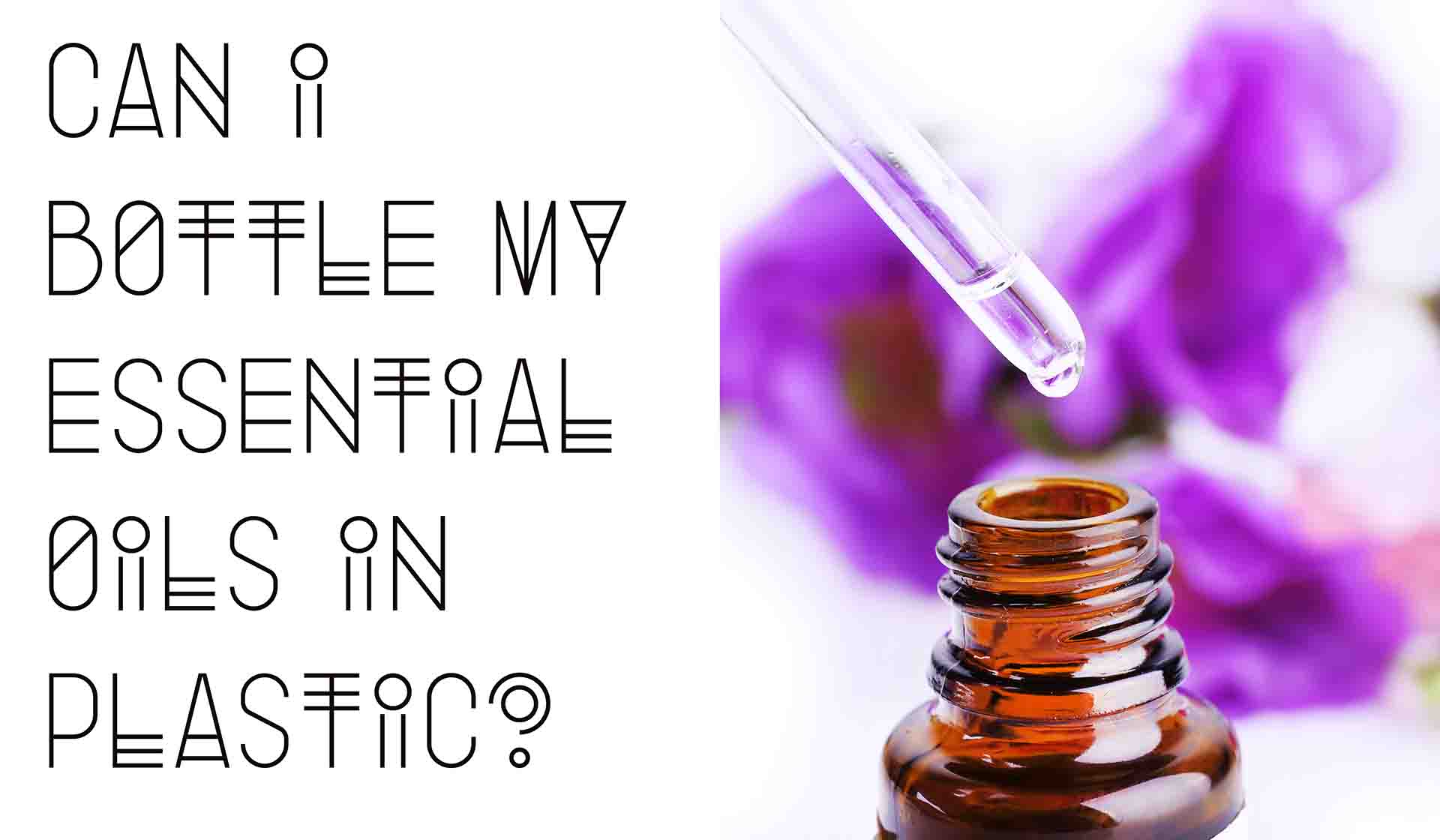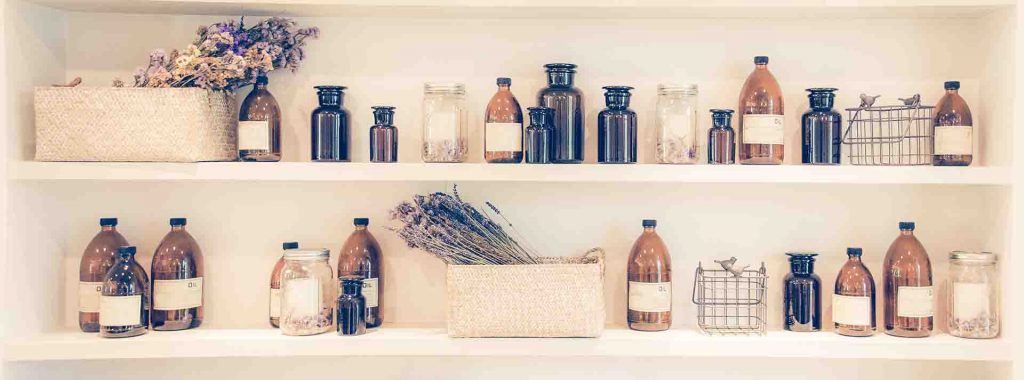Can I Bottle My Essential Oils in Plastic?

Essential oils are concentrated plant compounds, each having their own aromatic and medicinal properties and purposes. Essential oils need to be properly stored in an airtight essential oil-safe bottle. Many essential oil makers question the safety of both plastic and glass bottles when storing the oils and there is not a simple answer. Storage will depend on the essential oils you use.
Types of Essential Oils | Essential Oils in Plastic
Pure essential oils are very powerful. They need to be stored in airtight containers made of glass. Due to the strength of the oils, plastic containers can break down over time, causing damaging leaks and the loss of your oils. In addition to proper storage containers, your oils also need to be kept in a dark, cool place and away from direct sunlight. The sun’s UV rays increase oil temperatures and cause deterioration to the quality of your oils so storing pure essential oils in a colored glass container is highly recommended. Colored containers, like cobalt blue and amber-tinted glass, reflect the sun’s rays and protect oils when stored.
Diluted essential oils are mixed with other products, such as carrier oils like coconut oil and sweet almond oil. Carrier oils help to dilute the strength of the pure essential oils and are used when oils are going to be applied to the skin. Diluted oils can be stored in plastic containers, typically PET plastics, which are less expensive than glass containers. Diluted essential oil mixtures should also be kept out of direct sunlight and stored in a cool, dry place.
Regardless of the bottle type you use for storing essential oils, always make sure to use a high-quality, airtight lid and seal oils well before storage. If a cap is not replaced tightly, most essential oils will evaporate. This can cause a hefty financial loss to replace lost oils. Investing in the right essential oil packaging upfront may cost a little extra but it will protect your oils for a longer period of time.
Essential Oils Bottle Sizes
Individual essential oils are typically bottled in 5ml, 10ml, and 15ml sizes. Higher quality essential oils are usually sold in 2ml and 1dram sizes. In aromatherapy practices, essential oils are often measured in drops, with 1ml equaling 20 drops of product. One dram is equal to approximately 75 drops, and 1 ounce of product equates to about 600 drops.
As most essential oils are dispensed through a dropper cap, it is important to remember that, like plastic, rubber parts will deteriorate quickly when exposed to pure strength essential oils. Rubber will get gummy and can contaminate the quality of your oils. Glass droppers are recommended to protect your oils and ensure reliable dispensing for the long-term.
Essential Oil Storage and Care
Essential oils are flammable so it is vital you never leave bottles near open flames or other fire sources. If properly packaged, storing essential oils in your home is no more dangerous than storing other flammable products like liquor and spirits. Keeping all of your essential oils stored in the same location will make it easier for you to check on their condition from time to time. It is also important to keep essential oils away from young children. In concentrated form, essential oils are dangerous for kids.
Essential oils can expire over time. Oxidation occurs, causing a loss of beneficial therapeutic properties and, in some cases, the oil’s aroma. Some essential oil aromas, including sandalwood, actually mature over time, smelling stronger as time goes on. Citrus oils are the most likely to oxidize first so they should be stored with a reliable air-tight seal and stored in a dark place that maintains a consistent temperature.
Some oils, like Fennel and Aniseed, can solidify during storage. The natural waxes in these oils may turn back to solids in normal room temperatures. The wax can be re-melted by holding the bottle in your hand for a few minutes prior to use. Certain oils may need to sit for several hours in warmer temperatures to revert into an oil. During warmer seasons, it is recommended you store any carrier oils you plan to use for dilution in the refrigerator to protect their quality.
Helping Your Customers
When selling your essential oil products to customers, it is a good idea to also provide them with a handy list of storage suggestions based on the product they buy. A storage tip sheet for the pure essential oils and the diluted version of the oils should accompany each bottle to ensure customer satisfaction. If customers are not properly storing the oils and early expiration occurs, they may hold you responsible.
Instructions should also be provided for how to handle essential oils when they are being used. Some examples of handling tips include:
- Dispense oils into a clean spoon (preferably stainless steel) before adding into a mixture or recipe. As powerful as pure essential oils are, one drop too many can completely ruin a recipe.
- For oil application to the skin, it is vital the pure essential oils be first diluted with a carrier oil. If applied directly to the skin, severe burns and allergic reactions can occur. In the event oil is spilled directly onto the skin, it should be washed away with a carrier oil and not soap and water. The carrier oil will absorb the essential oil to better protect your skin. Soap and water can then be used to remove the carrier oil.
- Essential oils, even diluted ones, should never be applied near the ears, eyes, or other mucous membranes. Doing so can cause severe burning, irritation, and even more medical complications.
- Avoid using oils on small children. There are some oils which have been known to cause illness in children, including seizures. Consult with a doctor or essential oils expert before using on children and anyone diagnosed with epilepsy.
With proper storage, essential oils can last for years and may be used in a number of ways. From creating relaxing bath salts to soothing symptoms of the common cold, essential oils have many uses as an aromatherapy tool, an ingredient in your favorite recipe, or a favorite scent diffused throughout your home. Essential oil glass bottles not only help protect your products, they make a great showcase piece for store shelves.


We need bottles and packing of our essential and aromatic oil in bottle of glass please advise us how to pack it and where to do printing.
Thanks and Regards
Salman duakhana rawalpindi
Hello! I am always reading and researching for the growth of my business and I enjoyed this read. I’m curious, however, I have a plant that has been past down in my family now for five generations. It’s a healing plant and there is nothing like it. I’m coming to you for a packaging question. After I cure the oils and envelope them in either the lotion, cream or bath/body product I add a little essential oil. Would it be best to is a glass bottle? We have noticed over the yrs. That to plastic get gummy, looses the strengeth of the healing properties, and sometimes even leaks. I would really appreciate your impute.
Blessings,
Deanna
Hi Deanna! Thanks for your question. We definitely recommend using a glass bottle for any product containing essential oils.
Hello! I need to package an herbal bath product containing essential oils. If the inside of a plastic container was compleyely coated in a layer of beeswax prior to adding the product would it provide protection from the damage and contamination?
I’m looking forward in selling my my pain relief rubbing essential oil but quiet sure what I need to legally sell my my rubbing oil. License? Labels? Can I sell of my social media? I would totally appreciate the advice!
BIG PROBLEM.!! I HAVE ONE INCH BY ONE INCH THIN SQUARE BLOTTER TABS ON WHICH I PLACE A FEW DROPS OF DILUTED OILS LIKE LAVENDER OR PEPPERMINT. TESTED PLACING THE TABS IN SMALL POLY BAGS…POLY BAGS DO NOT WORK. ANY SUGGESTIONS TRYING FOIL, HDPE BAGS,ETC..BUT NEED HELP PLEASE!
Hello!! Thank you for sharing your article with us.
Hi
Do you have to use amber glass containers for candles made with essential oils?
Thanks
Hello Marie,
We do have amber glass containers for candles, link pasted below will take you to our catalogue.
https://www.bottlestore.com/industry-container-catalog/home-industrial-and-hospitality/candle-jars-wins-wholesale.html
Thank you for sharing that detail.It was fascinating and insightful.Continue to share useful resources over these blogs…
To differentiate all the mentioned oils from one another you can use custom essential oil packaging boxes. These customized boxes come with a variety of specifications to give a very royal look to the product.
Good post! I read your blog often and you always post excellent content. I posted this article on Facebook and my followers like it. Thanks for writing this!
I’m making a natural bug repellent for my kids, and it contains which hazel and essential oils. Can I use a plastic spray bottle or does it have to be glass? I really enjoyed this article.